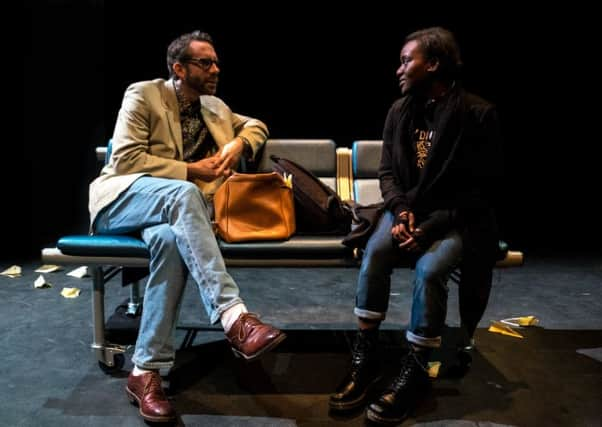Interview: director Nazli Tabatabai-Khatambakhsh on her new show Transit


This is the story that inspires Steven Gaythorpe’s play Transit, the latest work from the young Newcastle-based company Zendeh, founded a decade ago in Scotland; and its subject and style reflect many of the main preoccupations of the company, and of its Scottish-Iranian artistic director, Nazli Tabatabai-Khatambakhsh. Born in the northern Iranian city of Tabriz in the late 1970s (“I’ve always been a bit of a northerner,” she says), Nazli came to the UK with her parents when she was barely more than a baby. Her father was an academic, and they soon put down such firm roots in Edinburgh, where he was working, that they decided not to return to Iran, despite many visits to family there.
Nazli went to James Gillespie’s school, was encouraged by teachers there to explore her interest in “making different worlds and telling different stories”, spent her spare time queueing for free previews at the Lyceum and lapping up the Edinburgh Fringe, and eventually – after a post-school detour into training for photography and film – landed a job in 2001 as a trainee director at Leicester Haymarket Theatre, now The Curve. And since then, as a director, she has rarely looked back, working in Leicester and at the now-defunct Theatre Workshop in Edinburgh, before she founded Zendeh – the name means Alive in Farsi – in 2004.
Advertisement
Hide Ad“I think I did feel that theatre was a place for doing things, and for freedom of expression,” says Nazli. “And that meant that it was a place where people like me, who had inter-sectional identities, to come together and be the best of ourselves – offer our hearts to the audience, if you like. By 2004, I felt I had experienced all sorts of small and mid-scale theatre. But what I hadn’t experienced was being part of a touring company.
“And I also felt a need, in what was already a rich theatre landscape, to contribute something that was missing. There are so many hidden stories about the deep relationship between Britain and Iran, and about the similar experience of so many people who find themselves, for one reason or another, living between two cultures. People who are constantly asking “why am I here?” and “how did I come here?” as they go from one background to another.”
Since 2004, Zendeh’s work has therefore explored dozens of stories of people in movement from one world to another, both literally and metaphorically; one of their most recent shows, Cinema, seen at the Edinburgh Fringe in 2015, told the story of political change in Iran through the tale of the cinema cat at the Rex Cinema in Abadan, burned down in 1978 with the loss of 400 lives, in one of the world’s most horrific terrorist incidents. In 2007, the company had a chance to move to Newcastle and work with the Northern Stage company there; Tabatabai-Khatambakhsh clearly enjoys the duality in the company’s present role, as “a cross-border Northern touring company” that still retains close links with Scotland.
And over the years, the company has developed its own distinct working method, which involves extensive workshopping, improvisation and devised text, woven into the playwright’s work through a process that Nazli describes as both difficult and beautiful. The latest show, Transit, was workshopped in Manchester, Bradford, Gateshead and Glasgow; and Nazli is clear that although the company works with many people who are themselves dual nationals of two countries, or are engaged in other obvious transitions from one identity to another, it also recognises that “each artist is diverse”, and that some of their best work emerges from collaboration with people who, for other reasons, have their own expertise in processes of change.
“In Transit, for example, I think we’re talking very much about the kinds of conversations we sometimes have to have with our parents, as we get older,” says Nazli. “When we were first talking about the show, I was haunted all the time by those final lines from King Lear, “The weight of this sad time we must obey;/ Speak what we feel, not what we ought to say.” It’s about the trauma people suffer, both in war and in their personal lives, about telling the truth about that trauma, and about how far we’re prepared to go to make repair. So it’s a subject with huge human resonances, both in the post-war situation of the play, and in people’s lives generally.
“And I suppose it’s also about something that’s very topical at the moment, which is childhood trauma related to war, and how you can forgive that, or recover from it. Sometimes, I suspect, it’s not about forgiveness, but more about just learning not to relive it all the time, and beginning to understand that you can determine your own independent path in life. Familial disruption, whatever causes it, is never as black and white as it looks. And people need to know that they have a chance to move away from their pain, to transform it from a constantly relived experience into a memory. That’s hard, you know? But I think theatre is one of the places where we can begin to make it happen.” ■
Transit is at the Tron Theatre, Glasgow, 9-11 March, and at the Traverse, Edinburgh, 14-15 March.